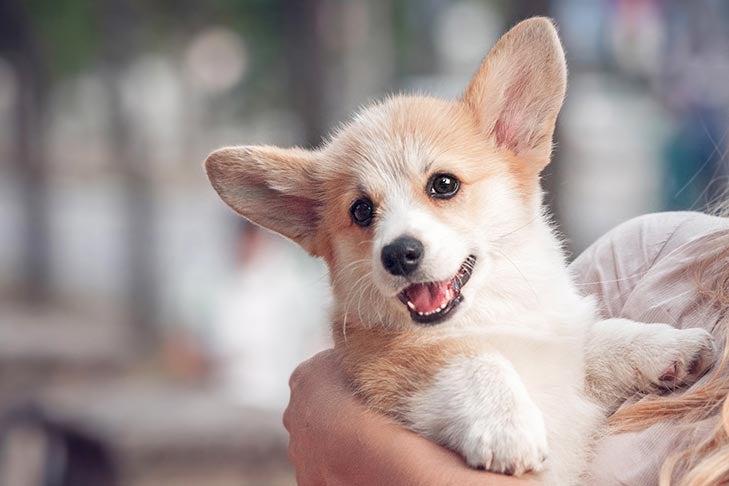Puppy teething can be a very difficult time for both you and your puppy. When a puppy’s 28 baby teeth begin to fall out around the age of three to four months and are eventually replaced by 42 adult teeth over the course of months, the process causes her moderate to severe pain. She’ll probably want to chew on everything, including you, in an effort to feel better.
The good news is that a puppy usually has all of its adult teeth erupted by the time it is seven months old. If you notice a retained baby tooth in your puppy’s mouth, be sure to inform your veterinarian. Occasionally, teeth do not fall out on their own. (Once she has all her adult teeth in, your dog’s desire to chew usually noticeably declines. In contrast to older adult dogs, most adolescent dogs exhibit an increased desire to chew until about 18 months of age, and for some dogs even longer. This doesn’t mean that it completely disappears. (Dogs will likely continue to chew occasionally for the rest of their lives; it’s what dogs do.)
Your puppy’s going to chew. You can’t stop her, and you shouldn’t even try. Instead, give her plenty of appropriate chew toys and control her environment to prevent her from encountering many opportunities to gnaw on inappropriate objects. Supervise!.
There is a huge variety of chew toys available to dog owners today, including some that can be filled with food to keep the dog interested. Buy toys with different textures until you find the one she chews on with the most fervor; then, buy more of that kind, whether they are made of leather, wood, plastic, rubber, or fabric that is ropy, fleecy, silky, or tough like a fire hose. The more diverse textures and densities of legal chew toys a puppy has, the less likely she is to chew on you or your belongings.
Offer your dog a tempting chew toy first, ideally, to prevent her from latching onto an unsuitable chew toy. If it’s too late for that, move her as soon as you can to a chew toy. Use leashes, tethers, exercise pens, or crates to keep her out of trouble when you can’t watch her, and keep toys readily available in every room so you can quickly grab one when you need one.
The better your management, the sooner you can give your dog house freedom and teach her to direct her teeth toward her own chew toys rather than your valuables. Meanwhile, be patient… This, too, shall pass.
Weeks 2 to 4:
When your puppy’s baby teeth begin to erupt, he will still be with his mother and breeder. His eyes will have opened by this time, and he will still be nursing.
Weeks 5 to 6:
All of your puppy’s baby teeth ought to have erupted by this point. Dogs usually have about 28 baby teeth total. Around this time, the breeder will probably have already weaned the litter’s puppies or will be in the process of doing so as they get used to eating moist, soft puppy food.

What should I do about my puppy’s chewing behaviors that I don’t like?
Don’t encourage behavior you don’t want, and don’t encourage it in others, either. If your puppy is chewing on your hands or any other part of your body, yell in a puppy-like voice, pull your hand away, and move on to another play area.
There is disagreement regarding the most effective method of chew-training puppies. Some techniques may even appear incoherent because what may be appropriate for one dog may not be for another. Check with your veterinarian for a personalized recommendation.
Puppies are inherently active and curious, so try to channel that energy by giving them plenty of exercise, training, and alternative feeding methods like puzzle toys. Do not place enticing items like children’s toys, shoes, or clothing where your puppy can get to them. At the same time provide lots of safe chew toys. Rotate chew toys frequently and only leave a few out at once to keep them “fresh.” Keep an eye on your puppy to prevent him from getting the chance to chew on something inappropriate.
FAQ
What age is teething the worst for puppies?
The worst time for teething is between 12 and 20 weeks of age, but most puppy owners start to notice it around 8 weeks, which is a popular time to get a new puppy. All of your puppy’s adult teeth will be present by the time they are around 6 months old.
Do puppies still teeth at 1 year old?
When your dog’s 42 adult teeth have finished erupting, which typically occurs between 5-8 months of age, teething is considered to be over. All of your dog’s adult teeth ought to have erupted by the time they turn one year old.
Can my puppy still be teething at 7 months?
Teething is a months-long process. It begins when puppies are about two weeks old when their first baby teeth begin to erupt and typically lasts until they are about eight months old when all of their adult teeth have fully erupted.
How do you know when a puppy stops teething?
Your puppy’s baby teeth ought to have fallen out by the time he is six months old. According to AKC Chief Veterinary Officer Dr. Although the puppy is likely to swallow the majority of the teeth, you might find puppy teeth on the floor, according to Jerry Klein. Tell your veterinarian if you notice any that don’t fall out.